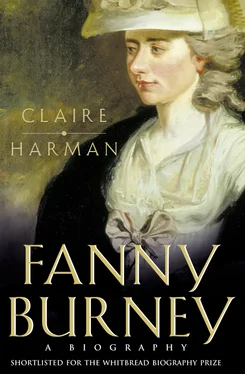Fanny’s rather jaundiced impression, expressed in her correspondence following the publication of her Memoirs of Doctor Burney , was that if the second Mrs Burney was wealthy at the time of her marriage, she did not spend the money on anyone but herself. Her father had, understandably, seen it more as a matter of pride to himself than blame to his wife that he continued to support his family by force of sheer hard work ‘without encroaching on the income of my wife’. 57 The notion that Elizabeth’s money made no difference to the household is disingenuous, however. The Burneys’ standard of living rose considerably (including the grand acquisition of their own coach), and Charles Burney, whether because of his reduced workload or increased well-being (or both), suddenly saw his career taking off in previously unthought-of ways. Within two years of his remarriage he had taken his doctorate at Oxford, written his first book, and was preparing for an extensive research tour on the Continent. Elizabeth was the enabling factor in all this.
The dispute in the 1830s between Stephen Allen and Fanny Burney confined itself to the matter of Elizabeth Allen Burney’s money, but there was a great deal more for a son to object to in Fanny’s Memoirs than the insinuation that his mother was ‘destitute of any provision when she consented to a second marriage’. 58 Fanny’s version of the growth of affection between Mrs Allen and her father clearly reflected her own difficulties in coming to terms with it, but it is almost breathtakingly unfair and inaccurate if we are to believe Dr Burney’s own account (and there is no reason why we should not) in the fragmentary memoirs on which Fanny herself purported to be basing her book.
In Fanny’s account, the affair was initiated by Mrs Allen (‘very handsome, but no longer in her bloom’ 59 ) on her arrival in London with Maria. She was widowed, but not, Fanny suggests, very severely, unlike Charles Burney, whose ‘superior grief’ was ‘as deep as it was acute’. 60 Her father’s degree of grieving was a problem for Fanny, who was disturbed by the thought that he might have ‘got over’ Esther’s death. She makes his profound bereavement not only the cause of ‘feeling admiration’ in Mrs Allen, who ‘saw him with daily increasing interest’, 61 but a way of clearing her father of any complicity in the affair: ‘insensibly he became solaced, while involuntarily she grew grateful, upon observing her rising influence over his spirits’. Pages of Fanny’s chapter on ‘Mrs Stephen Allen’ are taken up with eulogies of her own dead mother, put into the mind, if not the mouth, of Charles Burney:
If, by any exertion of which mortal man is capable, or any suffering which mortal man can sustain, Mr. Burney could have called back his vanished Esther to his ecstatic consciousness, labour, even to decrepitude, endurance even to torture, he would have borne, would have sought, would have blessed, for the most transient sight of her adored form. 62
In an attempt to rebut the idea that her father’s willingness to remarry might undermine the ‘pristine connubial tenderness’ of his first vows, Fanny came up with an ingenious interpretation of his behaviour, extremely unflattering to her stepmother:
The secret breast, alive to memory though deprived of sympathy, may still internally adhere to its own choice and fondness; notwithstanding the various and imperious calls of current existence may urge a second alliance: and urge it, from feelings and from affections as clear of inconstancy as of hypocrisy; urge it, from the best of motives, that of accommodating ourselves to our lot, with all its piercing privations; since our lot is dependent upon causes we have no means to either evade or fathom; and as remote from our direction as our wishes. 63
In other words, Charles Burney remarried, but stayed secretly, ‘internally’ faithful to ‘the angel whom [he] had lost’. He ‘recoiled from such an anodyne as demanded new vows to a new object’, but couldn’t help inflaming Mrs Allen all the more with the pathos of his vulnerability and ‘noble disinterestedness’ in her fortune when it was ‘completely lost’ in the Russian bankruptcy. 64 So much for the ‘not less than £4000’ Stephen Allen spoke of. So much, also, for any hint of Charles Burney’s ‘very impassioned’ feelings for Mrs Allen, his ‘constant importunity’ and pursuit of her to a hasty, secret marriage against her family’s wishes and her own best interests materially. If Fanny had got one thing right, it was that Elizabeth Allen must have felt unusually ‘impassioned’ about her new husband in return.
Fanny was writing her account, it must be remembered, more than sixty years later, and the intensity she ascribes to Charles Burney’s bereavement reflects her own intense losses by that date. But if the gulf of years makes it hard for her to untangle her own motives and feelings, it adds interest to the details which she considers significant with hindsight. There is no record of when the news of their father’s marriage was broken to the Burney children. Charles Burney simply relates that he and his new wife ‘kept our union as secret as possible for a time, inhabiting different houses’. 65 Fanny goes further, relating that though the secret was ‘faithfully preserved, for a certain time, by scrupulous discretion in the parties, and watchful circumspection in the witnesses’ (Crisp and Miss Young), something happened to force the hand of the clandestine couple:
as usual also, error and accident were soon at work to develop the transaction; and the loss of a letter, through some carelessness of conveyance, revealed suddenly but irrevocably the state of the connection.
This circumstance, however, though, at the time, cruelly distressing, served ultimately but to hasten their own views; as the discovery was necessarily followed by the personal union for which their hands had been joined. 66
What the miscarried letter contained is of less importance than at which address it was ‘lost’, Burney’s or his wife’s, and by whom ‘found’. ‘Some carelessness of conveyance’ – such a throwaway phrase – would have had to involve, in this case, either somebody wrongly opening a letter addressed to someone else, or reading a letter already opened by the addressee. The children had probably guessed that something was afoot between their father and Mrs Allen. Perhaps the discovery of the letter was an accident, perhaps not. If it was a deliberate act of snooping, it backfired nastily. We may wonder, but not wonder too long, given the authorship of that feeling phrase, who it was that found the incident so ‘cruelly distressing’.
Perhaps in order to give the children time to accustom themselves to the situation, Charles Burney and his new wife continued to live mostly apart. By July 1768 it was no longer possible to hide the fact that Elizabeth was pregnant, but she still retained her spacious dower-house in Lynn and spent most of her time there. Fortunately, the Burney girls loved their new stepsister Maria Allen, and took their cue from her generous and optimistic view of the prospects of the new arrangements. Their devotion to their father was such, too, that they would not openly have said anything to hurt him. Fanny’s wording is interesting when she describes how the sisters ‘were all earnest to contribute their small mites to the happiness of one of the most beloved of parents, by receiving, with the most respectful alacrity, the lady on whom he had cast his future hopes of regaining domestic comfort’. 67 One gets the impression that even if Elizabeth Allen had been an ogress, the children would have made an effort for their father’s sake. It does not mean that the shock of the news or their embarrassment was any the less.
Читать дальше












